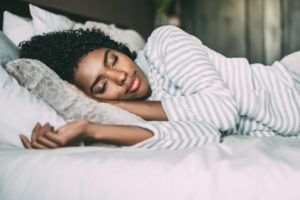
Do you feel excessively sleepy during the daytime or you wake up in the morning feeling tired or with a headache? If so, obstructive sleep apnea may be the culprit. OSA is a condition where the upper passages of the airway close off cause breathing trouble.
This can occur plenty of times every night, but typically the person is unaware of the frequent awakenings. Talk to the experienced dentist Port Charlotte if you have signs or symptoms of apnea. The expert will help you find the best apnea treatment that works best for you.
Symptoms that You Might Need Sleep Apnea
The most notable symptoms in adults include:
- Loud snoring
- Excessive daytime sleepiness
- Headache, sore throat, or dry mouth after waking up in the morning
- You have insomnia
- You wake up with shortness of breath
- You typically wake up to use the bathroom
- You experience mood swings
- You get irritated and sometimes wake up gasping or choking
- You face focus, attention, or memory issues while awake.
- Less interest in sex or are have sexual dysfunction
- Your bed partner says you snore and sometimes stop breathing while sleeping
- You are overweight, smoke tobacco, or drink alcohol.
How to Balance Work and Sleep?
Did you know about 25 million adults in the USA have apnea? Although diagnosing the condition is frightening, it’s treatable. There are certain lifestyle changes you can make at home to lower your symptoms. But, they should not replace medical treatment.
-
- Quit Smoking
Smokers are three times more likely to develop OLA, unlike people who’ve never smoked. It increases fluid retention and inflammation in the upper airway and throat.
-
- Lose Excessive Weight
The excess body makes apnea worse by causing increased pressure on the upper airways. Obese people usually have additional tissue in the back of the throat. This can cause increased lung volume and make it tougher to breathe. Weight loss and help you open up your blocked throat and treat your symptoms.
-
- Exercise Daily
Carrying out the exercise on regular basis can trigger a significant effect on sleep quality and duration. You can consider yoga, resistance, and aerobic training to enhance your breathing.
-
- Cut Down the Use of Caffeine and Heavy Metals
Do these two hours before sleeping. Monitoring caffeine intake will help you to maintain a healthy sleep schedule. Drink caffeine only in the morning with the meal.
-
- Take Enough Sleep
Stick to a balanced sleep schedule to sleep and relax better.
-
- Avoid Sleeping Pills, Alcohol, and Sedatives
Do not make use of them mainly before going to bed. It is because they can cause trouble with your breathing and can cause big trouble.
-
- Avoid Sleeping on Your Back or Side
Doing this will more likely make soft tissue and tongue to block your airway.
-
- Support Your Head Up
Lift the head of your bed head by four to six inches. Alternatively, you can try to elevate the body from the waist using a special cervical pillow.
-
- Use the Tennis Ball Trick
Sew a tennis ball into the back pocket of your pajama. You can also wedge a pillow with tennis balls stuffed behind your back.
This will prevent you from rolling on your back while sleeping. Try to strengthen muscles that keep your mouth closed. For this:
- Hold a pen between your teeth for ten to fifteen minutes before sleeping.
- Chew your favorite gum
- Open Nasal Passages
Open nasal passages at night using a saline spray, nasal irrigation system, nasal dilator, or breathing strips.
Treatment
For severe cases of apnea, your doctor may advise medical treatment:
-
- Therapies
- Continuous Positive Airway Pressure (CPAP)
- Therapies
CPAP is a machine that delivers air pressure via a mask while the user sleeps. The air pressure keeps the upper airway passages open, prevent snoring.
-
-
- Oral Appliances
-
Sleep apnea treatment option also includes oral appliances. Wearing it keeps your throat open by bringing the jaw forward. Your doctor will suggest the device that works best for you.
-
- Surgery
Dental professionals at R. Boyd Gilleland DDS recommend surgery if other treatment fails. If the patient has some kind of jaw structural problem, it’s a great option.
Apnea is becoming a common cause of excessive daytime sleepiness in adults and kids. It can also cause other problems too like a decrease in oxygen levels, high blood pressure, diabetes, heart disease, etc.
